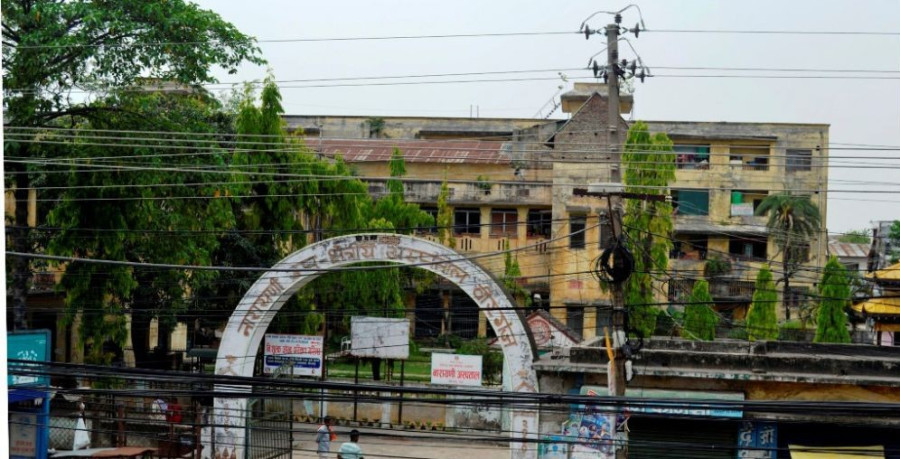National
Three Indian nationals in Birgunj test positive for Covid-19
Despite the lockdown, the emergence of new cases shows that the government needs to enforce stronger supplementary measures, public health experts say.
Arjun Poudel
Three Indian nationals residing in the city of Birgunj in Parsa district have tested positive for Covid-19, the Health Ministry confirmed on Sunday.
According to the ministry, throat and nasal swabs from 21 men residing in a mosque at Chhapkaiya in Birgunj Metropolitan City Ward No. 2 were tested for the coronavirus at the laboratory of the Vector Borne Disease Research and Training Center in Hetauda on Friday.
“Three of them aged 37, 44 and 55 were taken to an isolation ward of the Narayani Hospital after they were suspected to have contracted the virus,” the ministry said in a statement.
After the samples tested positive for Covid-19, they were dispatched to the National Public Health Laboratory in Kathmandu for confirmation.
“The laboratory on Saturday evening confirmed Covid-19 in all three samples,” said Dr Bikash Devkota, spokesperson for the Health Ministry, at a regular press briefing on Sunday. “All three have been sent to the isolation facility set up at the Narayani Provincial Hospital in Birgunj.
Devkota said that the health condition of all three patients is normal and that contact tracing of all who came in close contact with them has begun.
According to health officials in Parsa, 26 people who had come in contact with the three persons have been sent to a quarantine facility set up at the Siddhartha High School in Birgunj.
Saturday’s confirmation brings the total number of Covid-19 cases detected in Nepal to 12. Besides the three identified in Birgunj, all other patients are Nepali citizens from Kailali, Kanchanpur, Baglung and Kathmandu.
The last time Nepal reported new cases was on April 11, when three Covid-19 patients were identified in Kailali and Kanchanpur, including one case of local transmission. The government had subsequently extended the lockdown until April 15.
The confirmation of three more cases has now raised alarm and authorities have placed Birgunj on high alert.
Dr Madan Kumar Upadhyay, medical superintendent at Narayani Hospital, said that all out-patient department services have been halted until further notice.
Police meanwhile are attempting to ascertain when the three Indian nationals entered Nepal. According to police, the three men told health officials that they have been in Nepal for the last four months.
“How did they get infected if they have been in Nepal for the last four months?” an official at the Narayani Hospital told the Post.
A police official said that they are attempting to track the men’s travel history.
“We have yet to ascertain whether they entered Nepal before or after the lockdown,” he said.
Nepal enforced a nationwide lockdown starting March 24 and a day later, India announced a 21-day lockdown.
Nepal’s contact tracing has so far been poorly handled, even when there were nine cases. Now, given the confusion surrounding the new patients’ travel history, public health experts are wondering if the lockdown is the best way to contain the spread. There should be no new cases if the lockdown was effective, they say.
“A lockdown lessens the risk of community transmission,” said Dr Baburam Marasini, former director of the Epidemiology and Disease Control Division. “But what matters is how we utilise this lockdown period and what preparations and measures we are taking to fight the disease.”
Nepal is currently mulling extending the lockdown, as India continues to report a surge in Covid-19 cases despite being under lockdown. India has extended its lockdown until April 30 and Nepal is likely to follow suit.
Marasini, however, cautioned that continuing the lockdown could be akin to damming a swelling river.
“When the dam is opened, it creates devastation,” said Marasini. “What we need to understand is we need to utilise the lockdown to step up our efforts and introduce stronger measures.”
The World Health Organisation too has said that while lockdowns can contain community spread of the virus, governments must take other important measures.
Confirmation of the first local transmission last Saturday took Nepal into stage 2 of the pandemic, which means that the government needs to use the window provided by the lockdown to put in place a system to test and identify cases and expand capacity to treat and isolate, according to public health experts.
“Our state machinery is not in a position to handle the flow of patients if the lockdown is removed at once,” Dr Sharad Onta, professor at the Department of Community Medicine and Family Health at the Institute of Medicine, told the Post. “Risk of transmission remains as long as there are active cases in any part of the globe. But we cannot enforce the lockdown indefinitely.”
In Birgunj, fear has gripped locals. Entire neighbourhoods have closed themselves off.
“It is time for the concerned government agencies to start thinking about the next step once the lockdown is lifted,” said Onta.
Bhushan Yadav contributed reporting from Birgunj.
Related stories:-
- Provinces roll out rapid testing on all suspects and all those who’ve returned from India




 18.12°C Kathmandu
18.12°C Kathmandu














